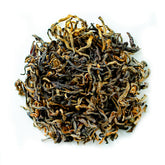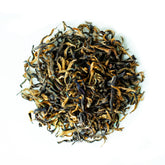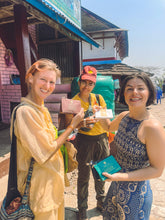The Hidden Struggles Behind Every Leaf – A Tea Farmer’s Truth in Jasbire
Nepal is known for its mountains, rich culture, and beautiful landscapes, but not many know about its incredible tea. In the hills of Ilam, where tea bushes stretch across the land, tea farming is not just work—it’s a way of life. For generations, families have depended on these tea gardens to survive, but their efforts often go unnoticed.
During our trip to Jasbire Tea Processing, we had the privilege of speaking with a farmer whose words captured the struggle, resilience, and untold sacrifices of the people behind Nepali tea. His story reflects not just his life but the reality faced by thousands of tea farmers across Nepal.
The Terrain Tests Us, but We Keep Going

Plucking tea leaves in Ilam is not easy. The terrain is steep and unforgiving, testing the physical and mental strength of every farmer. “We carry baskets on our backs, climb through these hills, and pick the leaves carefully by hand. Sometimes, the bushes tear our clothes, but we keep going. What choice do we have?” the farmer shared.
Here, there is no use of modern equipment. Farmers rely on Dokos—traditional Nepali woven baskets—to collect and carry the leaves. The weight of the tea combined with the difficult terrain often makes their work even harder. Yet, these farmers show immense courage and resilience.
The Roads Are Weak, But So Is the Support

Transportation remains a major issue. “The roads here are broken or not even built. We cannot get buses to transport the leaves or the workers. Often, we carry the tea ourselves down these dangerous paths,” he said with frustration.
The lack of proper infrastructure not only delays their work but also impacts the quality of the tea they produce. With no modern facilities and minimal government attention, the farmers feel abandoned.
“The government wants us to produce organic tea, which we agree is good for the land and health. But who will pay for the extra workers and tools we need for that? Organic farming needs more hands and resources,” he explained. The farmers' willingness to embrace organic cultivation is there, but they are held back by a lack of support and fair compensation.
15 Years of Patience, But No Fair Price

Tea cultivation is not an overnight success. “It takes years—sometimes 15 years—to grow healthy tea bushes. We give so much time, so much care. Yet, when the tea is ready, we don’t get a fair price,” he said, his voice filled with frustration.
Most of Nepal’s tea is exported to India, where it is sold as Darjeeling tea or other white-labeled products. This practice means the farmers do not receive credit or recognition for their work. “We sell it for low prices because we have no choice. They take our hard work and sell it for more elsewhere, without our name on it. It’s unfair.”
The farmer expressed his concern, adding, “The government must ensure we are paid properly. Without fair prices, we cannot hire more workers, buy tools, or sustain our families. This is why many young people are leaving Nepal for work abroad. If we guided them properly, they could help grow this industry.”
Organic Tea and the Health It Brings

Despite the struggles, the farmer spoke with pride about growing tea without pesticides. The government has encouraged organic farming, and farmers like him have embraced it for the health benefits it offers.
“I have stayed healthy for years because we eat organic food and drink our tea. But I see the youth today eating fast food and forgetting what is good for them. Organic tea is better for us and the earth, but if we are not paid fairly, how can we keep this up?”
The concern he shared was twofold—youth leaving for jobs abroad and ignoring the benefits of their own heritage. “If we could value what we have here, the land, the tea, and the traditions, we would not need to leave. There is power in this industry if we do it right.”
A Cry for Recognition and Fair Pricing

At the heart of his story was one key message: “We need fair prices.”
Years of patience, hard work, and sacrifice go into every leaf, yet the compensation is minimal. “We are proud of what we grow, but we cannot survive like this. If the government fixes the pricing and recognizes us, we can keep our farms alive. Without this, the future of Nepali tea is uncertain.”
The farmer’s voice reflected both frustration and hope. He knows the value of the land and the tea it produces. The question is—will others see it too?
The Path Forward

The story of the tea farmers in Ilam is not just theirs—it is a story that belongs to all of us. Every cup of Nepali tea carries the weight of their hard work, their struggles, and their dreams. Jasbire Tea Processing Pvt. Ltd. is working to create a future where farmers are valued, their tea is recognized, and the next generation can proudly carry on this legacy.
While the struggles are real, Nepal Tea Exchange is playing a key role in supporting farmers like those at Jasbire by connecting small-scale tea producers to fair markets.
But it cannot happen without change. Fair pricing, better infrastructure, and support for organic farming are essential. As consumers, choosing Nepalese tea, understanding its story, and supporting its farmers can make a difference.
Every Sip Tells Their Story

Behind every sip of tea lies years of hard work, courage, and patience. It is the story of farmers navigating steep hills, carrying heavy loads, and hoping for a future where their work is recognized.
Let us honor their efforts. Let us choose Nepalese tea and share their stories with the world. Because behind every sip, there is a farmer’s dream waiting to be recognized.



















